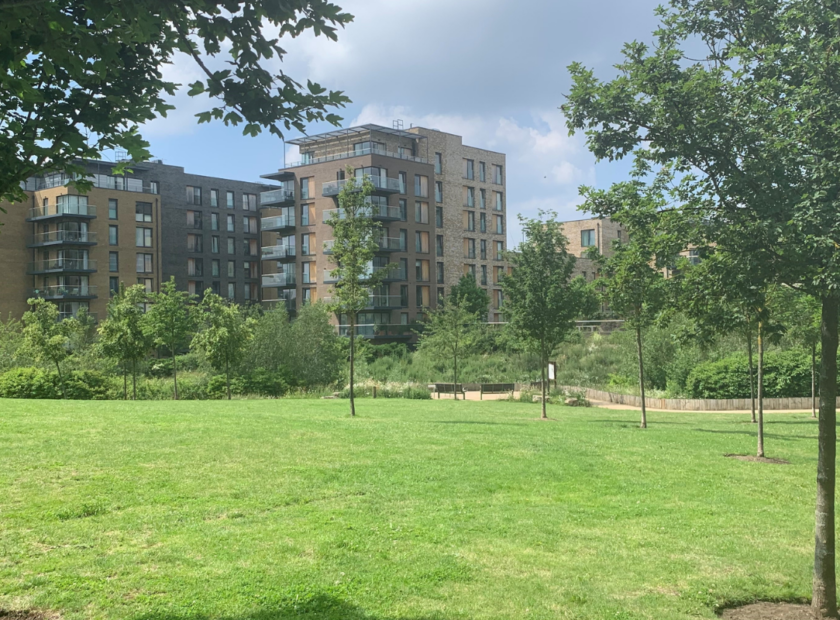The TCPA was founded by those who valued peace and cooperation over violent conflict. Ebenezer Howard’s political gamble was to suggest that by demonstrating a practical way to deliver fair and decent lives he would be able to inspire people to build a new society through peaceful means. History has judged this idea to be politically naive despite the transformation the Garden City idea brought to millions of ordinary people’s lives.
This history helps explains why in 2020 the TCPA began to work with the Belfast based community rights organisation, PPR, to explore what seems at face value to be a project that is bound to fail.
PPR was established in the fragile early days of the Anglo- Irish Peace Process by an inspirational Protestant woman who came originally from an affluent background and went on to lead the Irish Congress of Trade Unions and a kaleidoscope of campaigns for human rights and equality during her lifetime. Inez McCormack’s vision was to put human rights tools in the hands of communities who need them, so that they can lead their own campaigns for change and not be reliant upon anyone else for a seat at the table where decisions are made. PPR have been doing this tough work for more than a decade, north and south of the border in Ireland, and in Scotland.
The TCPA’s objective as part of the Take Back The City coalition was to support a conversation about what a non-sectarian, community led housing initiative would look like for the city. What’s even more challenging is that this project was focused on a large brownfield site in an area of West Belfast still divided by peace lines. Our role was to explore how this site could be an exemplar for cooperative, sustainable and inclusive community development, delivering homes for those in most housing need.
At this point it is worth saying that as an outsider to the complex political sensitivities of a post conflict city, our voice counts for very little. We do not aim to offer easy answers, nor do we underestimate just how many people in Belfast City Council, the Housing Executive and other duty holders share a commitment to see a non-sectarian future for this great city, built on principles of equality and human rights. Our small contribution is bringing TCPA’s expertise on health, climate and housing to explore positive possibilities. Given our heritage we also bring a desire to support the peaceful road towards a sustainable and socially just city.
Our role so far has been to listen and learn. There are some obvious lessons in terms of the continued sectarian segregation of large parts of the city, the sensitivity surrounding the interface zones which separate working class communities, the delicacy and complexity of the city’s politics, the special institutional arrangements for the delivery of social housing and the stark inequalities that persist twenty years into the, still fragile, peace process.
For example, it is the Housing Executive, rather than Belfast City Council, which has the lead on the delivery of affordable homes, but it is Housing Associations in partnership with developers who build these homes, and it is the Department for Communities Minister who ultimately sets the strategic agenda, albeit on a purse string from Westminster. Add the constitutional flux created by Brexit and the Covid pandemic into the mix and you get a sense of the complexity faced by people in Belfast who want to end the housing crisis and rise to the challenges of climate change.
The most striking learning has come from those in the most desperate housing need. From these people you get a sense of the risks and consequences of speaking about homelessness. The peace process has been a global exemplar of positive change, but I have been forcibly reminded that entrenched sectarian divisions and power dynamics, often related to poverty and lack of opportunity, are still a dominant force in the city. Intimidation is still directed against those who place social housing needs above sectarian boundaries.
Belfast is a city where your religion or ethnicity, and your income, dictates where you can live in peace.
For those of us not living and working in Belfast it’s easy to become numb to the notion of a society scarred by sectarianism. But, as the United Nations makes clear, sectarianism is just one aspect of racism. Try replacing the word sectarianism in this blog with the word racism and somehow you lose the numbness and start to think about how we owe it to the people of Belfast to support their pathway to an inclusive and peaceful city.
It is this context which makes our work to develop a vision for Community Housing on the Mackie’s site vitally important in demonstrating TCPA commitment to peace and sustainable development. The site itself is a large ex- industrial brownfield area between the North and West Belfast parliamentary constituencies. At least 2,100 children in the surrounding communities are living in conditions so dire that the public housing authority categorises them as officially homeless. The site has been identified for commercial use in the Belfast City Plan. Since then, a large adjacent area has been approved by the Planning Committee for private housing, which significantly has not been particularly controversial.
The proposition from the Take Back The City coalition is to see how the site could be developed as a cooperative, inclusive and sustainable community which provides new, healthy, net zero and affordable places to live. An exemplar site which can support the work of the Department for Communities, City Council and the Housing Executive in meeting housing targets by demonstrating practical pathways to a sustainable future. In summary, our view is that there are no technical, planning or engineering problems which would prevent such a scheme being delivered. The site works well for housing and is well related to local infrastructure. The question about its viability for community use lies in whether this public owned land could be made available at the right price for the right reasons.
In essence the future of this site is a political question not a practical one.
The TCPA is not qualified to make pronouncements about community politics in Belfast and we certainly take no political or sectarian sides. But I would say that we’ve been presented with three powerful reasons why change will not happen. First, we’ve been told that pointing out the problems about housing inequality and homelessness distracts from the great positive progress being made by the city. Second that we don’t understand the complexities of Belfast’s politics and so our involvement is not helpful. Finally, that supporting community led housing on an interface site will result in real harm by provoking intimidation against vulnerable groups such as asylum seekers.
We may be guilty, despite the best of our intentions, of all these mistakes. But to accept these barriers and walk away is to contribute to a kind of political stasis where positive ideas for a hopeful future are squashed if they result in inconvenient political questions. And political stasis is itself a real danger for any city or community. People in poverty for whom trickle down has not worked need to see tangible signs of a new kind of city which meets their needs regardless of their background. In any event our founding mission is to offer practical hope to communities by demonstrating, even in a modest way, that change is possible.
In that cause we should be willing to ask some uncomfortable questions.
On 15 November at 11am, the TCPA will be hosting a one-hour online conversation with the community campaigners working on the Mackie’s vision. We hope you will join us because in whatever part of the United Kingdom you live and work, the drive for positive change in difficult and complex political and economic circumstances has to be top of our agenda.
We have a lot to learn from and share with the people Belfast.
The TCPA is hosting an event on 15 November, between 11:00-12:00 exploring the delivery of non-sectarian housing in Belfast with guest speaker Marissa McMahon. Find more about that here.




